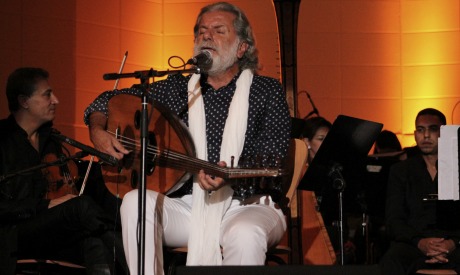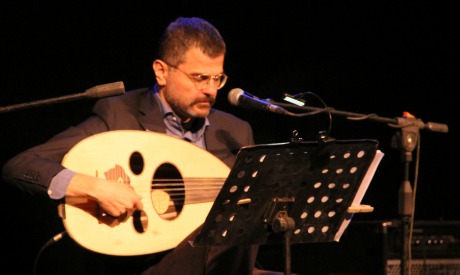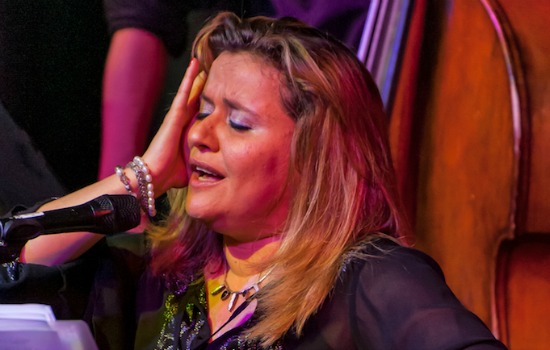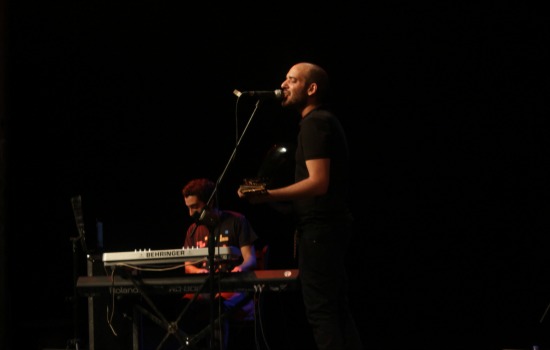Thus sang the iconic Fairouz in a short video released on YouTube in the last hours of 2015.
Our Jarrat al-Qamar (Neighbor to the Moon) — a moniker for the legendary Lebanese singer -- featured Fairouz before the camera with a lit candle, her beaming smile radiating optimism and hope.
Little did Fairouz know that 2016 would unravel into yet another nightmare: bitter, gloomy and distressing.
Today, the global war machine is as active as ever. Hundreds of thousands are displaced within and beyond borders, struggling to re-enact traces of home.
Against such a backdrop, the melody becomes an abode — a refuge from an ugly reality.
Fortunately, this year was ripe with countless musical wonders which, though incapable of reversing the mounting disenchantment, introduce various fragments of hope.
“Alexandria and Beirut are just a short walk away from each other."
Thus the Lebanese oud master, composer and singer Marcel Khalife during his mesmeric performance at the 14th Bibliotheca Alexandrina International Summer Festival last July.
"Had there been no borders, we would’ve strolled to Beirut tonight. But what shall we do? That’s our luck,” he continued accompanied by the Bibliotheca Alexandrina Orchestra under the baton of Hisham Gabr, and with his son Rami on piano, Khalife sang of love, resistance and a home beyond borders.
Through a two-hour performance, Khalife took us on a music voyage across the Arab world, one that took off from Alexandria and found its way to Al-Sham (The Levant), passing by Khalife’s own hometown, the Lebanese coastal town of Amchit, yet refusing to settle just there.
Khalife’s voice sent ripples of hope across the packed auditorium. From the repertoire of iconic Palestinian poet Mahmoud Darwish—Khalife performed the masterwork Jawaz Al-Safar (Passport), which narrates a Palestinian's reaction to Israeli authorities as they try to confiscate his passport and bar him from crossing into his homeland. The lyrics go:
“Stripped of my name and identity?
On soil I nourished with my own hands?
Today Job cried out
Filling the sky:
Don't make an example of me again!”
But alas, for Darwish—and Khalife alike—Palestine exists past borders.
Hence the concluding line, “All the hearts of the people are my identity /
So take away my passport!”
For Khalife, hope is a manifestation of resistance. Perhaps this serves as an explanation as to why he always concludes his concerts with the Ya Bahareyya (Oh Sailor Men), which over the years has come to be associated with the Palestinian people’s steadfastness in the face of Israeli occupation.
And why not? For at the heart of Khalife’s repertoire lies an unbridled transcendence of borders, and a staunch celebration of the collective identity of the Arab world.

Marcel Khalife performs with the Bibliotheca Alexandrina Orchestra under the baton of maestro Hisham Gabr. Bibliotheca Alexandrina, 29 July 2016. (Photo: Ati Metwaly)
"When grief kicks in, an inner journey becomes the answer."
So suggests award-winning Lebanese oud master, musician and singer Charbel Rouhana, who brought his latest yet musical project Tarab Safar, or the World Music Ensemble to the Cairene audience at the opening night of the 11th Hayy Festival at El-Genaina Theatre, earlier in June.
Tarab Safar is a music wonder in its own right. It takes the signature sound of Rouhana, fusing oriental music and jazz, a step further, exhibiting a bolder fusion of this harmony and leaving us buoyant about the future of the Arab music library.
The project, Rouhana told Ahram Online, was inspired by this idea of travelling within one’s own self.
“The most difficult yet beautiful kind of voyage is that on which you embark on within your own self. It’s a difficult and painful undertaking, but if you succeed at it, you’ll feel a state of nashwa (euphoria) and tarab (ecstasy through music),” explains Rouhana.
Work on the project, which comprises eight compositions, both instrumental music and songs with lyrics (selected from the repertoire of Sicilian-Arab poet Ibn Hamdis al-Siqilli), commenced in 2015. For months, Rouhana laboured on the compositions, which were then arranged by the participating musicians, rendering the project “a truly collective endeavor.”
The project debuted at Théatre Monnot in Beirut last December and garnered critical acclaim. Writing the event description for the concert, Rouhana described the project as a voyage to the 12th century during which “we…will bring back Ibn Hamdis [al-Siqilli] to our modern times with harmonies that he probably thought impossible."
"We will bridge this gap in a realm where there will no longer be 'old' and 'new', and 'far' and 'near', but where there will be beauty for the listener who seeks it,” he added.

Lebanese oud master Charbel Rouhana (Photo: Rawan Ezzat)
Celebrating Palestine's collective memory
Earlier in March, London-based Palestinian musician Reem Kelani released a double CD titled 'Reem Kelani: Live at the Tabernacle.' The album is a recording of Kelani’s 2012 live concert at the Tabernacle, London.
The songs performed that night spanned some of Kelani’s musical projects to date: from her decades-old project compiling and revisiting songs from Palestinian turath -- compiled during visits to the Levant or recovered from different literary texts -- to her long-term project on the iconic Egyptian composer Sayyid Darwish, in addition to other songs.
One highlight of the album is Kelani’s merging of Ya Raayhin el-Nabi and Bahallil Lak — two songs from the furaaqqiyyat (Songs of Parting) genre in Palestinian turath - into one medley.
“Ya Raayhin El-Nabi was sung in past times when they wanted to bid farewell to those going to hajj (pilgrimage),” Kelani told Ahram Online in an interview published following the album’s official launch concert last October.
As for Bahallil Lak, it’s usually performed in celebration of the baby’s teething. The festivity includes the preparation of the Palestinian s’nouniyyeh (teething) dessert, “made of wheat …sugar, spices, candied pulses and nuts,” Kelani writes in the album booklet.
“There is a narrative that I wanted to bring to the songs by juxtaposing them,” Kelani explained. “Namely that after 1948, all Palestinian songs, including those that were performed in different social celebrations, became part of Palestinian cultural resistance [against the Israeli occupation],” she added.
More than commend Palestinian people’s sumoud (steadfastness) in the face of a decades-old settler-colonial state, Kelani’s exploration of Palestinian turath emerges as a celebration of Palestine, its people, music and culture, and a preservation of Palestinian collective memory.

At her 2012 concert at the Tabernacle, Kelani performed five songs from Palestinian turath. She compiled some of these during visits made to the Levant over the years and recovered others from different literary texts (Photo: Courtesy of Christopher Scholey)
At her 2012 concert at the Tabernacle, Kelani performed five songs from Palestinian turath. She compiled some of these during visits made to the Levant over the years and recovered others from different literary texts (Photo: Courtesy of Christopher Scholey)
It was Palestinian musician Tamer Abu Ghazaleh’s third album Thulth (Third), that delved into the human psyche—exploring and laying bare the particulars of the states of grief, alienation and confusion. The project was first performed before the Egyptian audience in a listening party held at Cairo's ROOM Art Space earlier in May.
Produced by Mostakell, a music label for indie Arabic music operating under Eka3 platform and founded by Abu Ghazaleh himself, Thulth is Abu Ghazeleh’s third album following Mir’ah (Mirror, 2008) and his debut release Janayen El Ghona (2001).
The nine-track album comprises reinterpretations of two songs from Abu Ghazaleh’s second album Mir’ah, and also includes new songs performed in shows held throughout the past four years. Alongside Abu Ghazaleh (oud and vocals), the album features Khyam Allami on drums, Shadi El-Hosseiny on piano, and Mahmoud Waly on bass. Several songs were written by Abu Ghazaleh, while others were selected from the repertoires of a number of Arab poets, including Qais Ibnul Mulawah, Tamim Al-Barghouti, Ramez Farag and Naguib Sorour.
Granted, every song is a masterfully crafted concoction, but it is Alameh (A Sign), penned by Ramez Farag, that stands out perhaps because of its poignant undertones. The song meditates on the state of longing and its particulars. Its lyrics, translated on Abu Ghazaleh’s YouTube channel, proclaim:
“Give me a sign that says/That longing ends/That white clarity will fill our souls/That the morning door will open/And let in a carnival/Of seventy shining moons/A brave bright light/Unreasonably abundant...”
Equally powerful is Abu Ghazaleh’s brilliant renegotiation of his pièce de résistance Khabar Ajel (Breaking News), whose brusque lyrics go: “To all those hungry, from Chile to China/There’s free food in the land of Palestine/The offer has been on since the year 2000/Or a little before /And [will continue] until the end of times…”

Palestinian musician Tamer Abu Ghazaleh performs his latest project 'Thulth' (Third) (Photo: Nourhan Tewfik)
“O Palestinians, the fusilier has shot you
With Zionism which kills the doves that live under your protection
O Palestinians, I want to come and be with you, weapons in hand
And I want my hands to go down with yours to smash the snake's head
And then Hulagu's law will die
O Palestinians, exile has lasted so long
That the desert is moaning from the refugees and the victims
And the land remains nostalgic for the peasants who watered it
Revolution is the goal, and victory shall be your first step”
Composed and performed by the late Sheikh Imam based on lyrics by Egypt’s the late "Poet of the People" Ahmed Fouad Negm in 1968, these opening lines to Ya Falastinia (O Palestinians) have over the years constituted a celebration of the Palestinian people’s steadfastness and resistance, both of which still persist today.
The song was one of two songs recently revisited in a fresh collaboration between Egyptian band Eskenderella and Palestinian band Yalalan, the other song being Shayed Qusorak (Build your Palaces), also from Imam and Negm’s work together.
In this collaboration, both bands transcend borders and hail Palestinian peoples’ inexorable resistance against the Israeli occupier.
Behind both songs, which were recorded during Yalalan’s mini-Egypt tour last June, stands Palestinian musician Samer Jaradat, one of the most celebrated independent music producers in Palestine today.
Speaking to Ahram Online in an interview conducted last June, Jaradat said recording these two particular songs from Sheikh Imam’s repertoire constituted the “perfect choice to embody the encounter between Yalalan and Eskenderella.”
---
Perhaps Fairouz had good reason to be hopeful after all.
Beyond the bitterness of reality, it is relieving to be reminded that we have music to communicate our alienation, but more importantly, to comfort us too.
For more arts and culture news and updates, follow Ahram Online Arts and Culture on Twitter at @AhramOnlineArts and on Facebook at Ahram Online: Arts & Culture